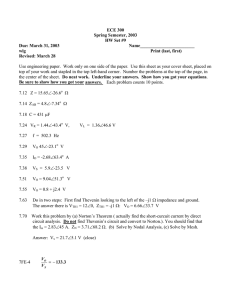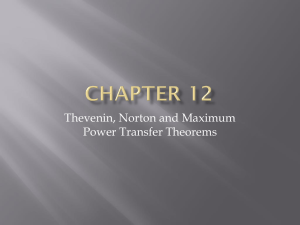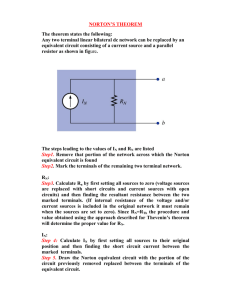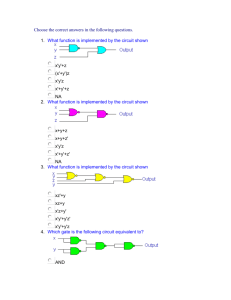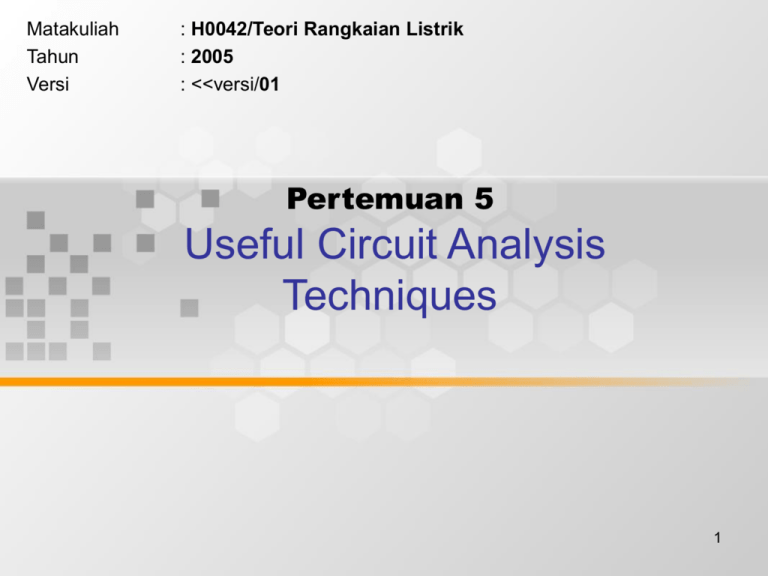
Matakuliah
Tahun
Versi
: H0042/Teori Rangkaian Listrik
: 2005
: <<versi/01
Pertemuan 5
Useful Circuit Analysis
Techniques
1
Learning Outcomes
Pada akhir pertemuan ini, diharapkan mahasiswa
akan mampu :
• Merangkum rangkaian listrik dengan
teorema thevenin norton
• Menghitung tahanan dan sumber
thevenin-norton.
2
Outline Materi
• Materi 1: analisa rangkaian menurut
teorema Norton.
• Materi 2 :aplikasi teorema Norton
• Materi 3 : analisa rangkaian menurut
teorema Thevenin
• Materi 4 : aplikasi teorema Thevenin
3
Chapter 5 Useful Circuit Analysis
Techniques
Fig. 5.22
Figs. from Example 5.6 (Thévenin/ Norton Equivalents).
Fig. 5.30
Circuit from Example 5.10.
Engineering Circuit Analysis Sixth Edition
W.H. Hayt, Jr., J.E. Kemmerly, S.M. Durbin
Copyright © 2002 McGraw-Hill, Inc. All Rights Reserved.
4
(a) A complex network including a load resistor RL. (b) A Thévenin
equivalent network connected to RL. (c) A Norton equivalent network
connected to RL.
W.H. Hayt, Jr., J.E. Kemmerly, S.M. Durbin, Engineering Circuit Analysis, Sixth Edition.
Copyright ©2002 McGraw-Hill. All rights reserved.
5
In the phasor domain, a two-terminal circuit containing
linear elements and sources can be replaced by the
Thevenin or Norton equivalent circuits shown in Fig. 8-24.
The general concept of Thevenin's and Norton's theorems
and their restrictions are the same as in the resistive circuit
studied in Chapter 3. The important difference here is that
the signals VT, IN, V, and I are phasors, and VT=1/YN and
ZL are complex numbers representing the source and load
impedances.
Finding the Thevenin or Norton equivalent of a phasor
circuit involves the same process as for resistance circuits,
except that now we must manipulate complex numbers.
The thevenin and Norton circuits are equivalent to each
other, so their circuit parameters are related as follows:
6
7
Determine the Thévenin and Norton Equivalents of
Network A in (a).
W.H. Hayt, Jr., J.E. Kemmerly, S.M. Durbin, Engineering Circuit Analysis, Sixth Edition.
Copyright ©2002 McGraw-Hill. All rights reserved.
8
Find the Thévenin equivalent of the circuit shown in (a).
Fig. 5.30 Circuit from Example 5.10.
W.H. Hayt, Jr., J.E. Kemmerly, S.M. Durbin, Engineering Circuit Analysis, Sixth Edition.
Copyright ©2002 McGraw-Hill. All rights reserved.
9
EXAMPLE
Both sources in Fig. 8-25(a) operate at a frequency of
=5000 rad/s. Find the steady-state voltage vR(t) using
source transformations.
SOLUTION:
In this example we use source transformations. We
observe that the voltage sources are connected in series
with an impedance and can be converted into the
following equivalent current sources:
10
11
shows the circuit after these two source transformations. The
two current sources are connected in parallel and can be
replaced by a single equivalent current source:
12
The four passive elements are connected in parallel
and can be replaced by an equivalent impedance:
The voltage across this equivalent impedance equals
VR,since one of the parallel elements is the resistor R.
Therefore, the unknown phasor voltage is
13
The value of VR is the same as found using
superposition. The corresponding time-domain function
is
14
RESUME
• Rangkaian listrik dapat dengan sumber
dan beban majemuk dapat dianalogikan
sebagai sumber dan tahanan tunggal
dengan metode penyederhanaan
rangkaian menurut teorema theveninnorton.
15

